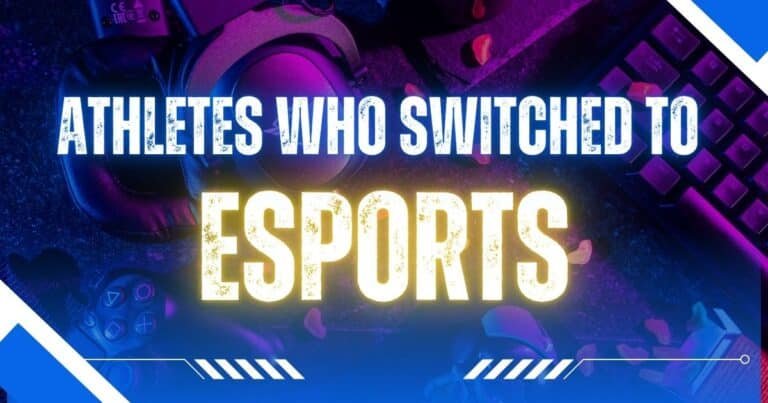In recent years, esports has gained immense popularity, captivating millions of players and viewers worldwide. The question of whether esports should be regarded as a sport is one that has been raised by the emergence of competitive video gaming. While some may argue that traditional sports require physical exertion and athleticism, esports offers a unique blend of strategic thinking, teamwork, and skillful execution. In this article, we will delve into the top 10 reasons why esports should be Considered a Sport
10 Reasons Why Esports Should Be Considered a Sport
Skill and Strategy
Esports demands a high level of skill and strategy, comparable to traditional sports. Professional players get intensive training to improve their reflexes, judgment, and hand-eye coordination. Just like in physical sports, esports athletes spend countless hours practicing, analyzing gameplay, and developing winning strategies. Esports is a fiercely competitive and difficult undertaking because the mental aptitude needed is comparable to that of regular sports.
Global Competitions
Esports tournaments attract players from all corners of the world, fostering a sense of international unity and competition. These events bring together top talent from various countries, showcasing the diverse skills and cultural backgrounds within the esports community. The global reach of esports tournaments highlights its universal appeal and significance, creating opportunities for players to represent their countries on a grand stage.
Teamwork and Collaboration
Successful esports teams rely on effective teamwork and collaboration to achieve victory. Just like in traditional sports, players must communicate, coordinate strategies, and work together seamlessly to outperform their opponents. Esports teams often have coaches, analysts, and support staff, mirroring the infrastructure found in conventional sports organizations. Esports’ focus on cooperation encourages camaraderie and develops important life skills like leadership, communication, and problem-solving.
Spectatorship and Entertainment Value
Esports has become a major form of entertainment, attracting millions of spectators both online and offline. Fans may watch their favorite players and teams participate in real-time thanks to live streaming services and specialized esports channels. The excitement and thrill of esports tournaments rival that of traditional sports events, with passionate crowds cheering on their idols and experiencing the highs and lows of intense gameplay. The entertainment value of esports cannot be underestimated, as it captivates a massive audience and generates a thriving community.
Professionalism and Infrastructure
The esports industry has evolved to mirror the professionalism and infrastructure seen in traditional sports. To assist its players, major esports organizations make significant investments in cutting-edge facilities, training centers, and gaming hardware. Sponsorships, endorsements, and lucrative prize pools have turned esports into a viable career path for talented individuals. The establishment of leagues, governing bodies, and regulations further solidifies esports as a legitimate sport, ensuring fair competition and fostering a sense of professionalism within the industry.

Physical and Mental Health
Contrary to popular belief, esports athletes prioritize their physical and mental well-being. Physical fitness is crucial for esports players, as it contributes to improved reflexes, stamina, and overall performance. Many professional gamers follow exercise routines, maintain healthy diets, and undergo regular medical check-ups to optimize their physical condition. Additionally, the esports community has seen a rise in mental health awareness, with players and organizations stressing the value of work-life balance, stress management, and self-care.
Scholarship Opportunities
Esports is not only limited to professional players; it has also opened doors to educational opportunities. Numerous universities and colleges now offer esports scholarships, recognizing the value and potential of competitive gaming. These scholarships provide aspiring esports athletes with the chance to pursue higher education while honing their gaming skills, fostering a balance between academics and their passion for esports. This shift highlights the growing acceptance of esports as a legitimate pursuit worthy of academic recognition.
Technological Advancements
When it comes to technical innovation, esports has been in the forefront, pushing the limits of live broadcasting and gameplay. The development of virtual reality, augmented reality, and advanced streaming platforms has enhanced the spectator experience, immersing viewers in the virtual worlds of their favorite games. Esports has also driven innovations in gaming hardware, such as high-performance computers, specialized gaming peripherals, and gaming consoles, further solidifying its position as a cutting-edge industry.
Economic Impact
The esports industry has a substantial economic impact, generating revenue through sponsorships, advertising, ticket sales, merchandise, and media rights. Esports events attract significant investments, with major companies and brands eager to be associated with this thriving market. The economic potential of esports has led to job creation, with opportunities in event management, broadcasting, game development, marketing, and more. The financial viability and growth of the esports industry underscore its legitimacy and long-term sustainability.
Cultural Significance and Evolution
Esports has become an integral part of modern culture, transcending geographical boundaries and demographics. It has established its own set of traditions, rituals, and icons that resonate with millions of enthusiasts worldwide. The evolution of esports has paved the way for new career paths, fostering innovation, creativity, and entrepreneurship. It is crucial to acknowledge esports’ effect and view them as a sport in its own right as their cultural relevance continues to increase.
Conclusion:
Esports has proven itself to be a legitimate sport, deserving recognition and acceptance on a global scale. With its blend of skill, strategy, teamwork, and entertainment value, esports has captivated millions of players and spectators worldwide. As the industry continues to grow and evolve, it is crucial to acknowledge the 10 reasons why esports should be considered a sport. We honor the commitment, skill, and enthusiasm of esports athletes by accepting them as real competitors, and we also add to the modern sports world’s ever-expanding terrain.
FAQs:
Are esports players considered athletes?
Yes, esports players are considered athletes due to the rigorous training, skill development, and competition involved in their craft. While they may not engage in physical exertion like traditional athletes, their mental agility, reflexes, and hand-eye coordination are on par with the requirements of many physical sports.
Is esports a growing industry?
Yes, esports is a rapidly growing industry. Its global audience and revenue have been consistently increasing year after year. Esports tournaments attract millions of viewers, and the industry continues to attract investments from major companies and sponsors.
Can esports be a career?
Yes, esports can be a viable career path for talented individuals. Professional players earn significant incomes through sponsorships, endorsements, prize money, and streaming revenue. Additionally, there are various roles within the esports ecosystem, such as coaches, analysts, casters, and content creators, offering career opportunities for passionate individuals.
How do esports tournaments work?
Esports tournaments usually feature multiple teams or individuals competing against each other in a series of matches or games. The winners of each match advance to the next round until a champion is determined. Depending on the game and the organizers, tournaments may have varied forms like single-elimination, double-elimination, or round-robin.
Are there age restrictions in esports?
While there are age restrictions in some esports tournaments, many games have no age limitations for participation. Some professional players have achieved success at a young age, showcasing the inclusive nature of esports and the opportunities it offers for talented individuals regardless of their age.
How can I get started in esports?
To get started in esports, you can begin by identifying the games you enjoy and have a passion for. Practice regularly, join online communities, and participate in local tournaments to improve your skills and gain experience. Networking with other players, watching professional streams, and seeking guidance from experienced individuals can also provide valuable insights and opportunities in the esports industry.




